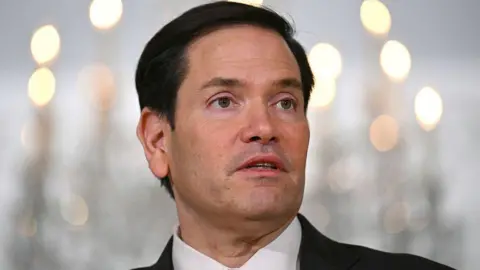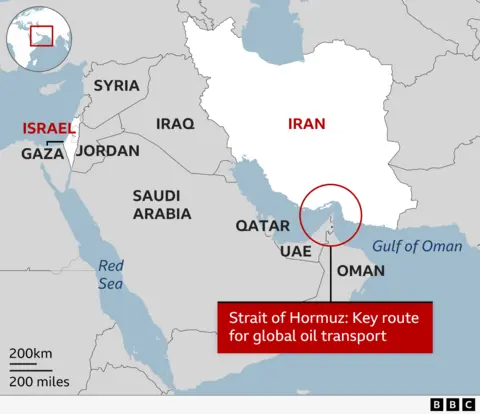US asks China to stop Iran from closing Strait of Hormuz
 Getty Images
Getty ImagesUS Secretary of State Marco Rubio has called on China to prevent Iran from closing the Strait of Hormuz, one of the world's most important shipping routes.
His comments came after Iran's state-run Press TV reported that parliament had approved a plan to close the Strait but added that the final decision lies with the Supreme National Security Council.
Any disruption to the supply of oil would have profound consequences for the economy. China in particular is the world's largest buyer of Iranian oil and has a close relationship with Tehran.
Oil prices rose following the US attack on Iranian nuclear sites, with the price of the benchmark Brent crude reaching its highest level in five months.
"I encourage the Chinese government in Beijing to call them [Iran] about that, because they heavily depend on the Straits of Hormuz for their oil," Rubio had said in an interview with Fox News on Sunday.
"If they [close the Straits]... it will be economic suicide for them. And we retain options to deal with that, but other countries should be looking at that as well. It would hurt other countries' economies a lot worse than ours."
Around 20% of the world's oil passes through the Strait of Hormuz, with major oil and gas producers in the Middle East using the waterway to transport energy from the region.
Any attempt to disrupt operations in the Strait could send global oil prices skyrocketing.
Oil prices jumped briefly when trading began on Monday, with Brent climbing to $81.40 a barrel. However, it then slid back to around $76.30, below where it had started the day.
In a post on his Truth Social platform on Monday, US President Donald Trump said: "EVERYONE, KEEP OIL PRICES DOWN. I'M WATCHING! YOU'RE PLAYING RIGHT INTO THE HANDS OF THE ENEMY. DON'T DO IT!"
Saul Kavonic, head of energy research at MST Financial, said: "The US is now positioned with an overwhelming defence posture in the region to be prepared for any Iran counter-attacks. But the risk for oil prices is the situation could escalate severely further."
- Follow live: Middle East tensions latest
- Strait of Hormuz: What happens if Iran shuts global oil corridor?
- InDepth: An unprecedented moment - but what the US and Iran do next could be even more momentous
- Decoy flights and seven B-2 stealth bombers - how US says it hit Iran's nuclear sites
- Chris Mason: UK's position on Iran is clear but will the US listen?
- Watch: How successful have the US strikes on Iran been?
The cost of crude oil affects everything from how much it costs to fill up your car to the price of food at the supermarket.
China in particular buys more oil from Iran than any other nation - with its imports from Iran surpassing 1.8 million barrels per day last month, according to data by ship tracking firm Vortexa.
Other major Asian economies, including India, Japan and South Korea, also rely heavily on crude oil that passes through the Strait.
Energy analyst Vandana Hari has said Iran has "little to gain and too much to lose" from closing the Strait.
"Iran risks turning its oil and gas producing neighbours in the Gulf into enemies and invoking the ire of its key market China by disrupting traffic in the Strait," Ms Hari told BBC News.

The US joined the conflict between Iran and Israel over the weekend, with President Trump saying Washington had "obliterated" Tehran's key nuclear sites.
However, it is not clear how much damage the strikes inflicted, with the UN's nuclear watchdog saying it was unable to assess the damage at the heavily fortified Fordo underground nuclear site. Iran has said there was only minor damage to Fordo.
Trump also warned Iran that it would face "far worse" future attacks if the country did not abandon its nuclear programme.
On Monday, Beijing said the US strikes had damaged Washington's credibility and called for an immediate ceasefire.
China's UN Ambassador Fu Cong said all parties should restrain "the impulse of force... and adding fuel to the fire", according to a state-run CCTV report.
In an editorial, Beijing's state newspaper Global Times also said US involvement in Iran "had further complicated and destabilised the Middle East situation" and that it was pushing the conflict to an "uncontrollable state".
